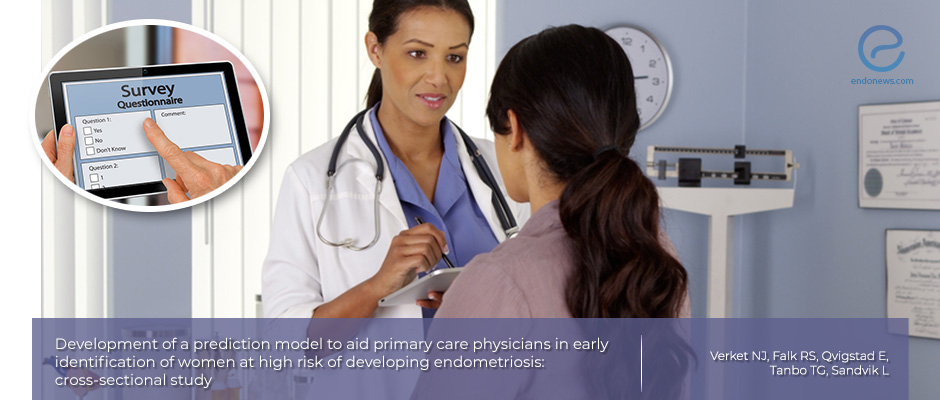Primary care physicians have a crucial role in the early diagnosis of endometriosis
Mar 6, 2020
A prediction model may be used in primary care for early diagnosis of endometriosis
Key Points
Importance:
- Clinical diagnosis of endometriosis is not easy since its major components like dysmenorrhea, dyspareunia, and infertility are common among other diseases.
- Currently, the most reliable diagnosis of endometriosis is confirmation of the pathological tissues via histopathology through surgical procedures.
- Identifying predictors of endometriosis to develop a prediction model that may be used in primary care would be beneficial for patient care.
Highlight:
- In endometriosis, screening tool development has been confined to women in secondary and tertiary gynecological surgical units or infertility clinics.
- A prediction model for primary care physicians to identify women at high risk of developing endometriosis is the main target of this research.
What's done here:
- Women aged 18–45 years were recruited from the Norwegian Endometriosis Association and a randomly selected group from the general population was used as control subjects.
- A postal questionnaire for an anonymous reply was sent to women with and without endometriosis; and by statistical analysis, predictors were identified to develop a prediction model
Key results:
- Absence from the school and the presence of endometriosis in close relatives were found to have a strong association with endometriosis.
- Besides, severe painful menstruation and the use of analgesics due to this in adolescence also have strong predictive value.
Lay Summary
Dr. Verket and associates from the University of Oslo, Norway, published their cross-sectional anonymous postal questionnaire study in "BMJ open".
Diagnosing endometriosis is difficult because dysmenorrhea, dyspareunia, and infertility are also common among other diseases. The most accurate and reliable diagnosis of endometriosis is by confirmation of the histopathologic findings through surgically resected biopsies. Screening tool development in endometriosis has been confined to women in secondary and tertiary gynecological surgical units or infertility clinics that have sophisticated health facilities.
A prediction model that could be used by primary care physicians would be very supportive in early diagnosis and treatment. This is the main target of current research.
Patients recruited from the Norwegian Endometriosis Association, aged 18–45 years and another randomly selected group from the general population was used as control. A postal questionnaire for an anonymous reply was sent to 157 women with and 156 women without endometriosis.
Following detailed statistical assessments, predictors were identified and combined to develop a prediction model. The main predictors with the most strong associations were the absence from school and the presence of endometriosis in the close relatives. Additionally, severe dysmenorrhea and the use of analgesics for this in adolescence also had strong predictive values. Persistent or increasing interference of dysmenorrhea with daily activities such as absenteeism from school should prompt referral to secondary or tertiary care physicians authorized in caring endometriosis patients.
The authors conclude that; “endometriosis should be considered in the differential diagnosis in women with frequent absenteeism from school or work due to dysmenorrhea and positive family history of endometriosis”. However, external validation is in need of implementation.
Research Source: https://www.ncbi.nlm.nih.gov/pubmed/31806607
primary care early diagnosis prediction model

